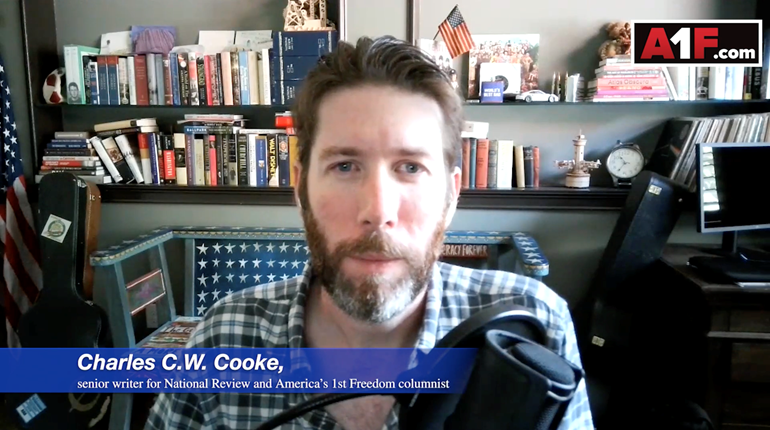
In Colorado, nearly half of the state’s sheriff’s departments are in an uproar against a new “red flag” law that would require law enforcement officers to confiscate the firearms of any Coloradan who has been deemed unsuitable to retain his Second Amendment rights, and that would do so in a way that violates the Fifth Amendment to the U.S. Constitution. One sheriff, in rural Weld County, is so concerned by the idea that he has vowed to go to prison rather than administer it. These warnings should serve as a clear indication that something has gone wrong with the way in which legislators have come to think about individual rights. In the Centennial State, the canaries are sending warnings up the shaft.
Contrary to the dark insinuations that are a mainstay of our modern politics, everybody in America hopes to see less violence and fewer criminal acts. Where there exists genuine disagreement, it is over how we might achieve that end, not whether it is worthwhile per se. As a result, debates around what we might do to increase public safety are conducted not between the caring and the indifferent, but between those who hope to reduce violence and do not care what barriers they knock down while getting there, and those who hope to reduce violence but will not countenance impinging upon core constitutional rights in the process.
The number of constitutional violations that the existing “red flag” laws rack up is nothing short of astonishing.
The sheriffs who are openly discussing going to jail belong to the latter group—which, naturally, is not a comfortable place for them to be. By their nature, “red flag” laws require law enforcement officers to act proactively, immediately and without nuance or discretion. If, as is the case here, those law enforcement officers believe those laws to be unconstitutional, they are presented with a terrible choice: Violate the oath they took to uphold the Constitution, or refuse to follow their orders. In Colorado, we are seeing a sizeable number opt for the latter course.
They will not stay alone. As the gun control movement becomes increasingly radical and increasingly national—and as it is forced by public opinion and judicial protection to find more “creative” ways to limit the right to keep and bear arms—it seems likely that government officials will increasingly find themselves torn between honoring their promises and doing their jobs. And not, it must be noted, purely on Second Amendment grounds, for, alarmingly enough, the road to limiting the Second Amendment seems often now to run through the rest of the Bill of Rights, too.
Among the disastrous proposals to which we have been subjected in recent years are that prospective gun owners submit to police-led searches of their social media accounts; that state and local governments cease to do business with companies whose political outlooks differ from their own; that legally owned property be confiscated from its owners as a result of post hoc legislative change; and that the federal government summarily restrict the rights of the hundreds of thousands of innocent people whose names have been placed onto secret lists. Now, as part of a broad push to adopt so-called “red flag” laws, we are seeing state governments being given the power to strip people of their gun rights without recourse to the sort of stringent due process protections that are, thankfully, the norm in the United States. Those who have warned for years that civil liberties cannot be treated a la carte, but rise and fall together are watching with their heads in their hands. This is what they were warning about all along.
As is typically the case with gun control measures, “red flag” laws are sold to voters as riskless guarantors of public safety and come replete with the bad-faith accusations of villainy to which advocates of the Bill of Rights have become sadly accustomed. “If you oppose this idea,” critics are told, “then you must support terrible outcomes.” In Colorado and beyond, opponents have been told that they are bad people who desire the abuse of women, do not care about the death of police officers, covet a general reduction in public safety and so forth. Which, of course, is dangerous nonsense. If one so chooses, one can always demagogue support for the Bill of Rights into enthusiasm for nefarious behavior—and, indeed, the same people always do. In the eyes of the wannabe authoritarian, champions of the First Amendment are mere advocates of “hate speech” or “lobbying” or “religious intolerance”; champions of the Fourth are trying to ensure that criminals have a safe place to hide; champions of the Fifth want “the guilty to walk free” and the evil to “stay silent”; champions of the Sixth hope to permit defendants to “revictimize the accused” and so forth.
There is, as a matter of fact, not a single American liberty that cannot be cast in this light. Depending on what the accuser is selling, the details may change. But the instinct most definitely does not. Thus it is that opposition to stripping rights away from Americans whose names have been placed unilaterally onto secret government lists is transmuted into support for “terrorists buying guns.” Thus it is that opposition to the government snooping around one’s social media and search histories is transmuted into support for “giving crazy people access to guns.” And thus it is that opposition to “red flag” laws that lack even basic protections for due process is transmuted into indifference toward women or children or anybody who is generally liked.
The correct response to this tactic is as simple as it is universally applicable: “No, I’m in favor of the Constitution.”
That, of course, is precisely what the sheriffs in Colorado are saying. And not just once, but twice. Critics of the sort of vaguely written “red flag” laws that have prompted otherwise law-abiding people to meditate aloud upon the likelihood of being sent to jail are concerned with the protection of not one, but of two core rights—the right to keep and bear arms, and the right to due process. As a matter of political rhetoric, it may make sense for the architects of “red flag” laws to pretend that merely to utter “but the children” or “but women” or “but the terrorists” is magically to change the facts on the ground or amend America’s legal and cultural foundations. But as a matter of fact, it does no such thing. For those who have taken an oath, for those who hope to defend the American constitutional order, and, yes, for those who merely seek the protection of the highest law in the land, there can be no “good intentions” exception.
And make no mistake: The number of constitutional violations that the existing “red flag” laws rack up is nothing short of astonishing. To be comfortable with “red flag” regimes as they currently exist is to accept that there is no legal problem with Americans being temporarily deprived of their constitutional rights when they have not been convicted, arrested or even charged with a crime; to accept that forcing citizens actively to prove their innocence—against authorities that may well be hostile to them—is compatible with the presumption of innocence; to accept that the state can deprive a person of his liberty and notify him after the fact; and to accept that, when convenient, a simple “reasonableness” standard may be substituted for more rigorous evidentiary standards consistent with the deprivation of an enumerated right.
Or, put another way, to be comfortable with “red flag” laws as they currently exist is to be comfortable with creating a de facto Second Amendment veto that can be wielded at will by one’s fellow citizens, and then enforced by agents of the state. It may be possible to create a “red flag” law that does not undermine half of the Bill of Rights and the 14th Amendment. Indeed, such a provision might even be desirable—once again, we all desire to limit criminal behavior. But, as of yet, we have seen neither the appetite nor the expertise that would be necessary to pull it off. Instead, we have watched as every attempt has been swiftly hijacked by political actors who, at best, do not care about the right that they are placing in jeopardy, and who, at worst, are actively opposed to its protection.
To turn the police into routine confiscation agents—often at the behest of people with ulterior motives, and without the robust protections that would guarantee a judge’s sober superintendence—drastically undermines that duty.
U.S. Supreme Court Justice Clarence Thomas has complained that the courts have, at times, treated the Second Amendment as a “second-class right.” He is correct. But compared to some state legislatures, the courts have been positively robust. It is difficult to imagine in what other circumstances citizens would be expected to spend their money and time petitioning for the restoration of a right that had been taken from them on the basis of the subjective opinions of their peers. It is difficult to imagine any other enumerated right being suspended—even for “just” two weeks—without an opportunity for an adversarial hearing. (What happened, I wonder, to “a right delayed is a right denied”?) It is difficult, too, to imagine any other enumerated right being limited in this way without serious penalties being imposed upon citizens and officials who are guilty of abuse. It is true that “due process” is, in a vacuum, a vague term that can mean different things in different circumstances. But we have an established way of doing things in the United States, and to carve out an exception for the Second Amendment is both myopic and foolish.
It is practically perilous, too. One of the core duties of any legislature is to ensure that police officers and citizens are put in tense, precarious or mutually antagonistic situations as rarely as is humanly possible. To turn the police into routine confiscation agents—often at the behest of people with ulterior motives, and without the robust protections that would guarantee a judge’s sober superintendence—drastically undermines that duty. Worse still, it seriously risks damaging the relationship between law enforcement and the citizens they serve. It is easy enough to tell an officer who raises objections to a new system that he can either acquiesce or be replaced. But it is impossible to tell the people that in the long run. You can attempt to replace cops. You cannot replace the citizenry. And if you end up replacing the cops that people want with the ones that they do not, you will end up with bigger problems than the ones you were trying to solve in the first instance.
Good laws are built upon a salutary combination of attention to detail, reflection over time, and respect for those whom they are likely to affect. The “red flag” laws that have popped up across the country exhibit none of these virtues. On the contrary: They have invariably been the result of rushed processes, whose timetables were designed to avoid scrutiny and dissent; they have been corrupted by hostile authors who regarded them as a useful opportunity to turn the right to keep and bear arms into a privilege; and they have been left full of vague language, unwarranted deference to authority and de facto presumptions of guilt of the type that would not fly in any other realm.
This problem is a perennial one. In Robert Bolt’s A Man for All Seasons, Thomas More chastises the young, overzealous William Roper when Roper suggests that in order to “get after the Devil,” he would “cut down every law” that stood in the way of his progress. “When the last law was down,” More asks, “and the Devil turned round on you—where would you hide, Roper, the laws all being flat?”
More presses him further: “If you cut them down—and you’re just the man to do it—d’you really think you could stand upright in the winds that would blow then?”
Well? Do we?
Charles C.W. Cooke is the editor of National Review Online and a frequent America’s 1st Freedom contributor.


































